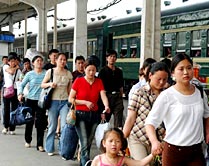
Economists and transport experts have called on the nation's rail authority to accelerate the reform of the monopolized system.
Lin Yueqin, an economist with Chinese Academy of Social Sciences, warned that the rail monopoly has led to inflexible management and financing and is also the main reason for the beleaguered state of the network.
Statistics from Ministry of Railways indicate the daily demand for rail wagons has surged to 300,000 since February, up from last year's daily average of 160,000.
However, the current rail network can only handle less than 100,000 wagons a day.
Because of intense rail freight transport, a railway cargo transport company near Guang'anmen Railway Station -- a major container transport centre in Beijing -- delayed many services and lost many customers in May, China News Week quoted an official with the company as saying.
Many customers have to resort to road transport as the rail network is unable to move goods in a timely fashion, the official said.
The existing system prevents more capital from being invested in the construction and renovation of the railway network, leading to inadequate capacity, Lin said.
A medium to long-term plan from the Ministry of Railways says that the national rail network will be increased from 73,000 kilometers to 100,000 kilometers.
But the current lack of investment means that only 1,000 kilometers of new track can be laid every year.
An estimate made by the National Development and Reform Commission's transport institute said that at least 120 billion yuan (US$14.5 billion) needs to be injected into railway construction annually in order to carry out the ministry's plan.
But this nearly doubles the current investment in this field, which is less than 60 billion yuan (US$7.3 billion) per year.
Rail construction projects mainly rely on government funding.
This includes the railway construction fund from the central government, loans from the State Development Bank and economic input from local government.
Lin said market mechanisms must replace administrative management methods to provide momentum for the dynamic growth of the industry, Lin said.
The investment and financing system must be reformed by introducing foreign capital, private capital and listed companies into the sector to increase the number of financing channels, he said.
Chen Yuanlong, a researcher with the commission's transport institute, said that the mixing of the functions of the government and enterprises of railway departments is the fundamental cause of the rail network's current problems.
The railway sector is among a few of the industries that are still operated under government monopoly in China.
Since a minor step in the reform of the industry might affect overall economic development, railway authorities have been too cautious to map out a reform program since the reform was first proposed in 2000.
Although the ministry has been trying to improve the efficiency of the rail network, it is often criticized for its hesitation to break its monopoly in the sector.
One plan that was considered by the ministry was to separate the operation of rail networks and rail transport to let passenger and freight transport companies compete in the market.
At the same time, a national rail network company would have been responsible for the construction and maintenance of railways as well as coordination of the network.
But the plan was scrapped in August 2001 over concerns that a unified rail network company might lead to corruption.
In a bid to alleviate transport pressures, the ministry has speeded up trains five times since 1997, with the latest acceleration starting on April 18.
But these measures have had a limited effect.
Lin stressed that expansion of transport capacity was the key to solving the rail network's problems.
The introduction of a joint-stock system in the railway sector might be an effective way to do this, he said.
But he stressed the industry watchdog must offer preferential policies to protect investors' rights and interests so they can really make a profit from the industry.
Answering critics of the slow pace of reform, an unnamed Ministry of Railways official said this was a result of caution to ensure that the reform is a success.
According to a report in the Beijing-based Caijing magazine, the Ministry of Railways has entrusted the China International Capital Corporation Ltd to draw up a plan for a share-holding reform of the rail network.
Finance firm KPMG also confirmed that it has accepted a auditing project from the ministry on the railway companies' overseas initial public offerings (IPO), the report said.
Three railway companies affiliated to the ministry -- which respectively handle containers, special cargo and cargo express transport businesses -- may be listed on overseas markets in the future.
(China Daily August 23, 2004)
|

